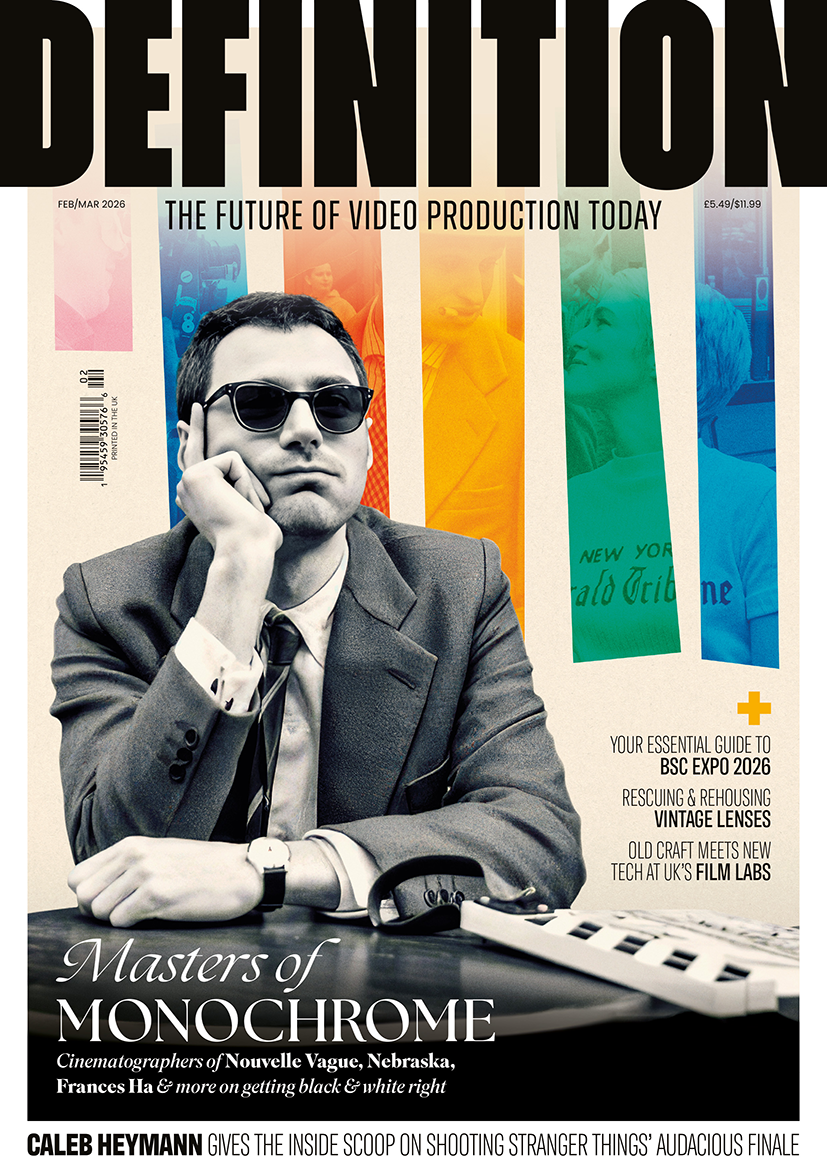
Sustainability Champions
Posted on Jun 29, 2024 by Samara Husbands
We are the champions!
We get the lowdown from four pioneering individuals and organisations leading the charge for a more sustainable future
In 2024, sustainability is at the forefront of everyday conversations – a topic addressed at trade shows and dissected by the media. Rather than just stressing its importance, we wanted to get to the heart of the issue: which bodies are working to protect the Earth’s – not to mention the industry’s – future? What are the obstacles involved in doing so? How can we combat climate change amid its acceleration?
Plus, despite sustainability’s topical popularity, many still do not grasp its concept – a challenge posed to those trying to promote it.
We hear from four sustainability champions (deemed so by us here at Definition) about environmental action and the steps being taken towards a cleaner, greener future, particularly in the film sector – from renewable energy to climate-focused content to mandates, certifications and standards.
Lydia Dean Pilcher
Founder of production company Cine Mosaic, Lydia Pilcher is a double Emmy-winning, Academy Award-nominated producer of over 40 films. An ambassador for sustainability for over 15 years, she’s also co-founder of the Producers Guild of America’s PGA Green and greenproductionguide.com, among many other achievements.
A leading voice in the film industry and environmental expert, Lydia Dean Pilcher puts it plainly: clean energy and climate storytelling are two key routes towards a more sustainable future. As a co-leader of an inter-guild sustainability alliance (which includes the Writers, Producers and Directors Guilds of America), Pilcher represents roughly 500,000 members. “It’s a vast constituency. We have found that, over the last few years, just about every union and guild has now formed a green committee, eco committee, sustainability committee – this is something that is top of mind,” she shares.
As co-chair of the DGA’s Sustainable Future Committee, Pilcher prioritises the transition to clean energy, which mainly involves cutting carbon emissions and reducing reliance on fossil fuels “in the accelerated time frame we find ourselves in,” she says. Having attended the Paris Agreement in 2015, Pilcher was front row when the Intergovernmental Panel on Climate Change (IPCC) unveiled its special report on global warming. “The IPCC set the 1.5°C threshold, which was the level we needed not to go beyond if we did not want to live in a climate-altered future,” she recalls. “We were hopeful; we really thought we were going to kick this. What we know now is that the last eight years have been the hottest years on the planet. We have hit 1.5°C – and we’re going over it. We haven’t done enough.”
While every sector is arguably at fault, the film industry has been especially wasteful at times, using fossil fuels – which ‘play a significant role in global warming’ – to power productions. “We had been sitting there for years talking about recycling, plastic and so on. It was when the carbon calculators for film and television had been invented, which started to get implemented and the studios released all this data, that we realised we’re not going to change anything if we don’t address the fossil fuel situation,” explains Pilcher.
Clean energy is on the rise, with renewable diesel available in areas like California (where many major studios are based), electric vehicles becoming more mainstream and solar panels being added to the tops of trailers. Pilcher argues that these measures be mandated. “Why not?” she asks. “It’s essentially page one now. It works.”
Studios have begun introducing climate-centred criteria; for instance, Netflix requires a sustainability advisor to be present on every set, while NBCUniversal recently announced its GreenerLight programme, which vets each project, “requiring it to contain some form of climate storytelling element and have a sustainable production plan in place,” describes Pilcher. “They’re the only studio with the policy. It’s innovative, and was taken on by the chairman and CCO, Donna Langley. She embraced it and said: ‘We’re doing it.’ That’s what needs to happen; the buy-in must happen at the top.”
Climate storytelling, for Pilcher, ‘has been an underutilised solution’ in the film industry. “Telling stories is what we do,” she states. “Stories are the way people connect to culture and the world we’re living in. It can also encourage people to think about things they hadn’t before – or think about them differently.
Pilcher emphasises that climate storytelling doesn’t have to be over-the-top obvious. “It can be layered into the world-building of any story,” she argues. “It can be a narrative plot twist, a heightening of stakes for characters, a subplot or even on-screen behaviour. I find there’s almost no movie where you can’t figure out a way to incorporate a character’s relationship to nature and human agency.”
There’s a whole subgenre of films about extreme weather events, but these tend to be dystopian thrillers rather than genuine reflections of our climate’s current state. According to Pilcher, these stories leave us feeling helpless and psychologically distanced – generally failing to spark productive conversations. “We’re trying to understand what we can do to bridge that gap.”
Over the years, Pilcher has found that most people genuinely are interested in sustainability. “I always say – and we talk about this with our guilds and unions – any set you’re on, if you start talking about it and put it out there that you’re interested in talking about it, the allies will come forward,” she assures. “People want to know what they can do.”
Amelia Price
Amelia Price is the co-director of Sustainable Film and co-founder of The Generator Project. She is also the chair of the Sustainability Working Group for the Production Guild of Great Britain (PGGB).
Amelia Price’s career began in production, but – declining to choose between work and motherhood – she switched to location management, as this provided greater flexibility. It wasn’t until then that she truly realised “how wasteful and destructive the industry is,” she says. “You see exactly what’s left behind. It was eye-opening.”
As someone who has been keenly environmentally aware since childhood (‘I was a member of the WWF from the age of seven’), this realisation came as quite a shock, leaving Price with ample cognitive dissonance. “I went off and retrained – I have an IEMA accreditation in environmental management – and then said, ‘Right, that’s it. I’m not going to take any more locations jobs.’ I threw myself into sustainability.”
About three years ago, Price co-founded Sustainable Film – a UK-based sustainability consultancy – with former colleague Jimmy Keeping. “We decided to join forces to take on the industry and get a bit more support,” Price admits. “It’s fairly lonely in sustainability.”
Working in the environmental sector comes with its fair share of challenges. “The main pushback is that people don’t really understand what we do,” says Price. Like Pilcher, Price notes that “people were used to the environmental department being a runner on-set, physically sorting the waste – which is not a good use of anybody’s time.” She stresses the oft-forgotten ‘bigger picture’, which is ‘sustaining the industry’ as a whole and supporting the three pillars: people, planet and profit.
“We ask productions difficult questions: do they have mental health support? Is there any chance for flexible working? It’s something I’m particularly passionate about – how we get the best out of people,” describes Price. “We need the industry to make money and thrive so people can get paid, but it’s all interconnected. It’s much more interesting when we’re working with people who are engaged.”
Price’s day-to-day mainly consists of conversations – meeting with suppliers or people on productions, upskilling them where appropriate and connecting them with one another. “We spend a lot of time explaining that this is what the industry needs. If you want to be successful in the industry, then you’re going to need to do X, Y and Z.” This is especially true for the PGGB. “The Guild’s membership is a key group of people – a powerful voice for sustainability. It’s about getting them on board with what we’re doing. It can be hard work if you get a line producer who doesn’t understand why you exist, essentially,” Price admits.
Price echoes Pilcher on the importance of climate storytelling. “As the makers of content internationally,” she says of the UK screen industries, “there’s so much we could do in terms of narrative and getting simple things into everyday scenes. We’ve got such power pertaining to massive behaviour change. It doesn’t need to be complicated.”
The UK is one of a few countries arguably leading the charge. “We have a fair amount of the technology in place, and people are starting to get used to it. When you shoot abroad, it can be a bit trickier,” Price confesses. That said, sustainability is a ‘small world’, and Price maintains an international network of professionals who can ‘provide the on-the-ground support’.
Frustration is par for the course in this line of work. “Not everyone loves looking at carbon footprints,” admits Price, “but every day is a new learning experience too. You have to be patient – and must rein your expectations in,” she concludes. However, a breakthrough (as well as the satisfaction that comes with it) would be worth the wait.
BAFTA Albert
Albert is BAFTA’s sustainability branch, leading the UK screen industry by example in ensuring a greener future for all. Since its inception in 2011, the organisation has launched several certifications that standardise sustainable production practices and demonstrate the industry’s commitment to climate action.
As part of its toolkit, albert’s carbon calculator allows productions to measure and report their carbon footprints, adding to a database of over 1000 projects. Following a carbon action plan can also result in an award of one, two or three stars if completed successfully.
In late 2020, albert released the Screen New Deal, a report which addresses the carbon impact of tentpole productions and suggests specific, implementable actions to achieve net zero. The report’s primary message was simple: the screen industry requires systemic change.
Breaking down the data, the Screen New Deal found that 50% of a production’s carbon emissions come from fuel (used in cars and generators), 30% from energy (gas and electricity), 16% from air travel and 4% from temporary accommodation. Put more plainly, a production’s average fuel consumption could fill over 11,000 car tanks; average air travel equates to 11 Earth-to-Moon trips; and average energy consumption could power Times Square for five days. These findings motivated albert to offer five areas of opportunity: production materials, energy and water use, studio buildings and facilities, studio sites and locations and production planning.
Three years later, in 2023, albert announced the Studio Sustainability Standard, ‘the world’s first sustainability assessment designed specifically for studio spaces’, according to albert’s web article. The Standard invites studios to take part and identify areas for improvement across six themes: climate, circularity, nature, people, management and data. Studios receive a personalised performance report and overall grade, allowing them to compare their work with other studios and develop year after year. In 2023/2024, 29 companies partook, including Sony Pictures, Sky Studios Elstree and 3 Mills Studios.
Albert’s website also offers tonnes of free training, educational articles and practical advice to environmentally focused creative – including a section on climate storytelling. With case studies spanning factual entertainment (The Great Celebrity Bake Off), feature films (The Boy Who Harnessed the Wind), sitcoms (Community) and scripted dramas (Doctor Who), albert not only provides productions with imitable examples, but also clear, actionable goals to ensure a sustainable future.
Learn more at wearealbert.org
The Grid Project
At this point, renewable energy’s role in achieving net zero should be undeniable. Six years ago, Film London discovered that – during a shoot in Flanders, Belgium – a TV production “plugged into lamp posts to avoid using diesel generators,” says Michelle Jenkins, head of production services. “This provided the inspiration for the Grid Project to install bespoke electrical feeder pillars into frequently used unit base sites in London, supplying energy from renewable sources, deleting the need for diesel generators and thus reducing all emissions on-site to zero.”
Funded by the Mayor of London’s Good Growth Fund and supported via the London Economic Action Partnership, NBCUniversal, Interreg Europe Green Screen and the British Film Commission, the Grid Project is Film London’s first foray into local infrastructure. After a lengthy period of “investigating appropriate sites, setting up an Industry Advisory Group, understanding power requirements and assessing installation costs, Victoria Park was chosen as the key pilot site,” describes Jenkins.
“Detailed analysis completed by Arup for Victoria Park estimated that, during 2018, production generators consumed 64,082 litres of diesel and 1656 litres of petrol,” he adds. “The estimated CO2 emitted by the generators was 169,556kg; estimated annual particulate matter was 7.43kg; and estimated annual nitrous oxide from diesel and petrol was 2393kg.”
Film London officially announced the Grid Project in summer 2023. Powered by energy provider Ecotricity, the project saved approximately 62,385 litres of diesel and petrol, 161 tonnes of CO2 and two tonnes of NOx between November 2022 and February 2024.
“This is just the beginning!” enthuses Jenkins. “We are excited to report that many of our partners have already been inspired by the Project – enough to start installing their own feeder pillars. We’ll continue to promote and help others do the same in the UK and beyond.”
Learn more at filmlondon.org.uk
This feature was first published in the July 2024 issue of Definition.









